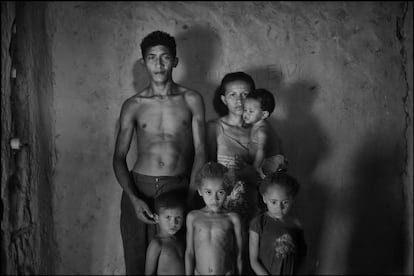Searching for the invisible Brazilians
Government is out to find people living in extreme poverty to sign them up for financial aid

Sitting outside a clay home in Alto Alegre do Pindaré, a rural spot in the western portion of the poverty-ridden state of Maranhão, in northern Brazil, three-year-old Lucas and his sisters Ludmila, six, and Bruna, five, play with a dead bird. Their mother Maria Eliane da Silva, 22, is inside the house caring for the youngest member of the family, an eight-month-old baby.
The father, Antonilson dos Santos, does odd jobs now and then, making an average of 30 reales ($12) a day when he is in employment. On a good month he can pay the rent on their three-bedroom home (50 reales or $21) and still afford food for the children. On a bad month, they fill their bellies with a porridge made of flour and water.
This family has never had a regular source of income, and it was not eligible for Bolsa Familia, the government’s main welfare program for people living in extreme poverty, because its members lacked the necessary identification documents to register. They were invisible to the state.
The government has located 1.35 million eligible families that were not receiving any aid
But Brazil is now actively looking for these poor citizens, who are not getting the financial aid to which they are entitled.
The Bolsa Familia program was created under Fernando Henrique Cardoso (1995-2002) and bolstered by Luiz Inácio Lula da Silva (2003-2010). Nowadays, 13.9 million families are receiving aid, representing nearly a quarter of Brazil’s total population of 200 million.
The United Nations Food and Agriculture Organization (FAO) said in a report issued last week that this program has been instrumental in reducing hunger in Brazil by half over the last 20 years.
But there are still 3.4 million people, or 1.7 percent of the population, who go hungry. That is why all the candidates to the presidential elections of October 5 assert that they will keep the program in place, although they disagree on the best way to manage it.
Despite the program’s achievements, there are detractors who view it as an electoral tool that makes citizens not want to work.

Meanwhile, a municipal government team recently went out to Alto Alegre do Pindaré as part of the drive to find some of the invisible poor who will be added to the subsidy program.
For two days, they visited people such as Antônia Costa, 31, who moonlights as a prostitute to make some extra income. They saw the home of Francilene Araújo, a 14-year-old who has just gotten married and never been outside her village. They talked to Sara de Jesús, who is four months pregnant and, along with her four-year-old daughter, is going hungry.
None of these people sought to apply for the subsidy because they live far from the Social Assistance Office that runs the program. Once identified, the municipal team enrolled the families, explained how the system works, and showed them how to obtain the necessary identification documents.
In Alto Alegre do Pindaré, population 32,000, six out of every 10 residents are poor. Of these six, four fall into the category of extreme poverty, as their per capita income is less than 70 reales ($30).
The only thing citizens really want is a job with a contract”
Renato Meirelles, Data Popular
Employment options around here are scarce. There are a few small commercial establishments in the town center, and there are positions within the local government. Most people work out in the fields or in roço da juquira, which involves cleaning areas that have been deforested to make way for cattle breeding. Half of the population of Alto Alegre do Pindaré depends on Bolsa Familia, but an estimated 25 percent of citizens who are eligible still haven’t signed up.
But last month, 44 new families registered. Ever since the government launched the search program three years ago, it has located 1.35 million eligible families that were not receiving any aid, according to the Ministry of Social Development and Fight against Hunger.
Those who work closely with subsidy recipients say that nobody wants their children to have to apply for aid in the future. In fact, 1.7 million families have dropped out of the program voluntarily, stating they no longer need it.
Renato Meirelles, president of Data Popular, an agency specializing in information about the poorest segments of the population, says it is simply not true that the Bolsa Familia program makes people go soft.
“The only thing citizens really want is a job with a contract,” he says.
In order to create employment opportunities for aid recipients, the government has also started offering technical training courses through a program called Pronatec.
“The response was really positive,” explains Tereza Campello, the minister for social development. “We were planning to guarantee a million spots until December of this year, but we’ve already had 1.36 million people sign up. Many still believe that the poor are poor because they don’t work. Over half of Bolsa Familia recipients don’t work because they are under 14, and 75 percent of adults have a job. There are people who supplement their income with this program, but that does not mean that they are lazy.”
Experts agree that this is the natural way to keep fighting poverty in Brazil, where hopefully one day welfare will no longer be necessary. “But since Bolsa Familia was such a success, nobody has the nerve to eliminate it,” concludes Campello.
Tu suscripción se está usando en otro dispositivo
¿Quieres añadir otro usuario a tu suscripción?
Si continúas leyendo en este dispositivo, no se podrá leer en el otro.
FlechaTu suscripción se está usando en otro dispositivo y solo puedes acceder a EL PAÍS desde un dispositivo a la vez.
Si quieres compartir tu cuenta, cambia tu suscripción a la modalidad Premium, así podrás añadir otro usuario. Cada uno accederá con su propia cuenta de email, lo que os permitirá personalizar vuestra experiencia en EL PAÍS.
En el caso de no saber quién está usando tu cuenta, te recomendamos cambiar tu contraseña aquí.
Si decides continuar compartiendo tu cuenta, este mensaje se mostrará en tu dispositivo y en el de la otra persona que está usando tu cuenta de forma indefinida, afectando a tu experiencia de lectura. Puedes consultar aquí los términos y condiciones de la suscripción digital.








































